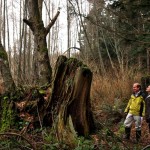
Family donates conservation easement
By Gale Fiege, HeraldNet.com
CAMANO ISLAND — More than 30 acres of forest and wetlands located adjacent to Cama Beach State Park will be preserved forever thanks to a gift from a Camano Island couple.
Joe and Cathy Holton, along with their four sons and seven grandchildren, donated a conservation easement on their property to Whidbey Camano Land Trust, which now ensures that the land remains perpetually protected and free from development.
The Holtons could have made a lot of money selling the property, where theoretically a developer could have built up to 30 houses. At the very least, the family might have sold it for a half-million dollars, said Cathy Holton’s son Randy Reeves, a real estate broker.
“It’s not all altruistic, however,” Reeves said. “My folks have a connection to the land and they happen to have the economic means to preserve it. We have seen our share of misguided, unsustainable development. We believe this is the highest and best use of the property.”
In August 2011, the Holtons attended a community meeting called by the land trust, which was seeking to find potential conservation easements among property owners living near the state parks on Camano.
The Holtons stepped right up, said Elizabeth Guss, development director with the Whidbey Camano Land Trust.
“Their contribution is a beautiful illustration of a family thinking ahead into the future and seeing the big picture,” Guss said. “It’s a way to marry private property rights with the common good.”
Joe and Cathy Holton are known on the island for their generosity and their volunteer work with the Friends of Camano Island Parks. Conservation of some of their property was something they had been considering since they bought it in the 1990s. The Holtons also own a house near the beach as well as a pasture adjacent to the preserved land.
Together, the three generations of the family compared the development opportunities to the conservation values and decided to donate the conservation easement, said Joe Holton, 83.
“The decision was unanimous,” Holton said. “We didn’t want to see a high-density residential development there. We wanted to leave a legacy into the future, for our family and for the community.”
Jeff Wheeler, manager of the Cama Beach State Park said he is pleased with the donation and the buffer it provides for the park.
“I’ve known Joe and Cathy for years and have found them to be wonderful people and great volunteers. With the thoughtful actions of people like Cathy and Joe, this island is a great place for people and the environment to co-exist,” Wheeler said. “(The Holton property) preserves an animal corridor between the two state parks.”
With the donation of the conservation easement, the Holton’s property doesn’t become a public park. It remains in private hands. However, the benefits to the community are numerous, Guss said.
“It’s a significant gift to the larger good, in terms of water sources, wildlife and clean air,” she said.
A public trail that connects Cama Beach and Camano Island Island State Park runs along the east side of the Holton property. On the other side, the property has views of Saratoga Passage.
The 30 acres includes a peat bog, a 10-acre wetland, an upland mature forest that is home to trees estimated to be more than 250 years old.
“My parents didn’t want to see any wildlife move away from here,” Reeves said on Monday as he walked through the property on a deer trail.
The trees on the property include big-leaf maple, vine maple, Western red cedar, Douglas fir, hemlock, madrona and grand fir. The land is covered with sword fern, native nettle, salmonberries and elderberry.
Along with deer, the land is home to other animals and many species of birds.
“We have even seen red-legged frogs, which are not common here, so that’s a good sign that the forest is healthy,” Reeves said. “We have few invasive species here.”
Reeves said trees on the Holton property tell a story.
One can see evidence of a fire that raged across the island in the 1920s along with stumps that are reminders of the logging that took place there in the late 1890s and early 1900s.
“It’s a great example of the regeneration of a forest,” he said.
In his job, Reeves, 52, said he often has real estate clients who aim to pave paradise.
“We want to inspire others to make gifts of conservation easements, which can sometimes mean tax advantages for people,” he said. “Land is a precious resource. It’s about preserving it for future generations.
“I want my son’s son to come here.”
